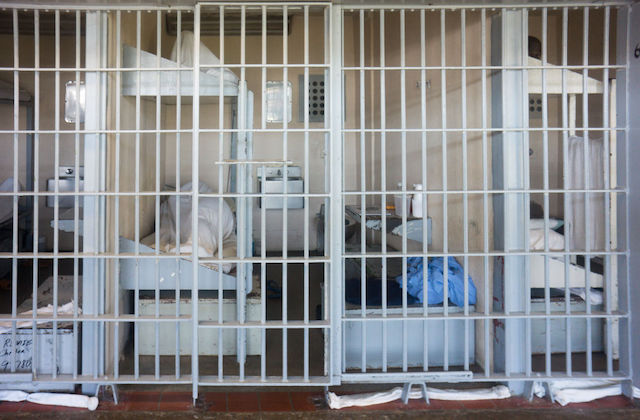Doctors and advocates are urging U.S. prison officials to release low-risk incarcerated people in an effort to minimize the spread of the deadly coronavirus, The Guardian reports. They are asking officials to “temporarily forgive bail” and “clamp down on other programs that keep low-risk offenders imprisoned,” the report notes.
Brown University epidemiologist Josiah Rich tells The Guardian, “The more people behind bars, the more transmissions you are going to have.” Jails and prisons are a potential Petri dish for coronavirus because people inside have limited access to basic hygiene methods. For example, although incarcerated people in New York state are required to manufacture hand sanitizer, they are not allowed to use it due to its high alcohol content. Additionally, people wearing handcuffs while being transported are unable to cough or sneeze into their elbows. There is also no way to self-quarantine inside prison or jail.
The Guardian reports:
In countries hard-hit by coronavirus, there have been mass prison releases and even jail riots in the wake of infections.
Three Chinese provinces registered more than 500 cases of coronavirus in prisons. Iran temporarily released 70,000 prisoners. In Italy, riots occurred in at least two dozen prisons and six inmates died after they broke into an infirmary and overdosed on methadone.
Criminal justice reform advocates at the Prison Policy Initiative (PPI) offered “five examples of common-sense policies that could slow the spread of the virus,” in a brief posted on their web site. They believe these steps are a good guide for governors and other state officials to begin making necessary changes.
From PPI:
rnt
- Release medically fragile and older adults.
rnt
- Stop charging medical co-pays in prison.
rnt
- Lower jail admissions to reduce “jail churn.”
rnt
- Reduce unnecessary parole and probation meetings.
rnt
- Eliminate parole and probation revocations for technical violations.
rn
There is one more thing that every pandemic plan needs to include: a commitment to continue finding ways—once this potential pandemic ends—to minimize the number of confined people and to improve conditions for those who are incarcerated, both in anticipation of the next pandemic and in recognition of the every day public health impact of incarceration.
Rich stressed to The Guardian that people detained simply because they can’t afford to pay their cash bail (or the payment courts require in order to leave jail while awaiting a hearing) are only increasing chances that coronavirus will spread throughout the prison population.
“They are not there because we need to keep society safe, they are there because they are too poor to afford bail,” said Rich. “If they were wealthy, they would have the means. So, do we think we should keep them in there in the face of this epidemic?”
As PPI states in their brief, “protecting vulnerable people would improve outcomes for them, reduce the burden on the health care system, protect essential correctional staff from illness, and slow the spread of the disease.”
